This article is the first of a three-part series on Herb Sheaner, a US combat veteran and Jesuit Dallas track and field head coach. On the 81st anniversary of Pearl Harbor, Viewpoint Editor Peter Loh, Chief Associate Editor Griffin Taber, and I had the honor to interview Mr. Sheaner. During our interview, we discussed Mr. Sheaner’s high school years, WWII service, imprisonment, escape from captivity, and his post-war experiences and Jesuit coaching career. Mr. Sheaner is one of the last Americans who was a veteran of WW2 and his story, like the story of countless others, will continue to remain a significant piece in US history.
“Soon, I knew that I was either going to replace or join the disabled, killed, and wounded.” – Herb Sheaner
Our lunch generously was provided by Thomas Cuisine. With the help of Dr. Degen (moderator of the Jesuit Roundup), Katy Wilson (digital media specialist), and Mike Sheaner (Mr. Herb Sheaner’s son), we spent 2 hours learning how these few months shaped the rest of his life.
This first article will be covering Mr. Sheaner’s high school years, college experience, and induction into the United States Army.
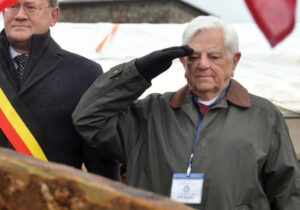
What were your aspirations or dreams prior to military life?
Well, I had different aspirations during my lifetime. When I was in high school, I dreamed of attending West Point. In order to be accepted into West Point, I had to take an application test.
In fact, I was one of 17 students that the local Texas Congressman considered. I imagine if you’re gonna get selected, you got to be from a prestigious family that donated frequently to the congressman’s projects. So, I was not admitted into the academy. However, I applied and was accepted into Texas A&M, which included a large military institution at the time.
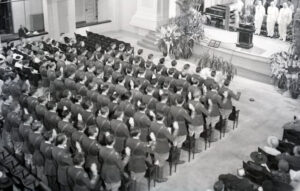
How was your education and experience as a student-cadet like?
Over my time at Texas A&M, I was a company commander and graduated a major. I thought that this was a tremendous victory for me, especially for someone who was not as tall and powerful as the majority of cadets.
Nearly a hundred percent of the boys were in ROTC. That was in high school, but a lot of the athletes over there where I went to school didn’t get into ROTC. Overall, the boys accepted into ROTC were simply athletic due to their schools’ numerous sports opportunities. For instance, Highland Park offered multiple sports like football and basketball. After high school, I started attending Texas A&M in September 1942.
During this time, Jesuit Dallas was just established. For the majority of my youth, I did not imagine Jesuit’s establishment and my future relationship with it. So, I already had good knowledge of the military and how it worked like through these ROTC programs before I got inducted into the service.
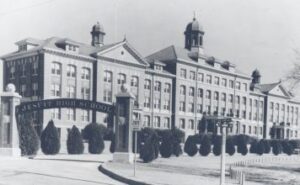
Can you share with us your draft into the military?
The government saw I was 17 in high school. Now the high school extends a whole year longer. So I graduated at 17. By that summer I was 18, but I’d enroll, I was already enrolled in Texas A&M, which was a hundred percent military. Back then, everybody was in the army. If you graduated from college, there is a high chance that you could be an officer.
Before my senior year, I guess the army decided to allow 18-year-olds to enter the US Army. So I was correct. The US Army drafted 18-year-old boys. Well, after receiving our draft notices, we went back to Dallas and report to the induction center at a certain time.
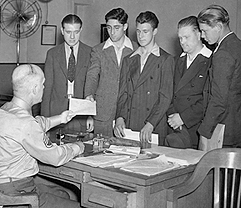
After I joined they did give you multiple options. Options included armor, artillery, cavalry, and infantry. Well, my ROTC experience was all infantry. Specifically, I led a company of infantry soldiers for a year in high school. So, infantry was all on my mind. However, most of my friends applied to join the Air Force. In general, the lifestyle in the Army was different from the Air Force whether it was training or combat missions, as the Air Force was a lot more flamboyant than the Army.
What was your military training prior to deployment like?
By May 1943, I was inducted and sent to Camp Wheeler, Georgia for Infantry Training. Military training was not too difficult for me because I already had the experience. Also, I had previously spent one of my summers at an ROTC boot camp in high school.
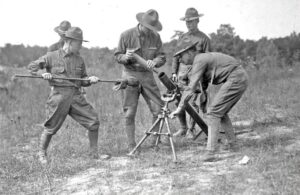
As for Camp Wheeler, they have a standard rifle range. Every time you go to infantry training in the Army, you always go to the rifle range. In the end, I ended up being an expert with the rifle. Due to my accurate handling of the rifle, they made me the sniper and lead scout of the outfit I was assigned to, Company G.
Even though I excelled with the rifle, I was a small little guy when I was in high school. I went into high school at 82 pounds. Wow! Unlike you guys at Jesuit, I didn’t weigh more than probably 108 pounds when I graduated from high school. By the time I was assigned to my infantry unit, I had grown to 161 pounds. That was quite a significant change!
During my training, I developed speed and strength, and I would’ve been on the track team. But by that time, it was too late because the growth process had to take much time and effort.
What did you do after your training at Camp Wheeler?
Well, after my training, I had to take a test. Apparently, I passed the test and was offered to go to an Army-specialized training program. By the way, the creation of this Army program was passed by Congress. This meant that a certain number of those people would go back to college for advanced officer training.
So, after my basic training and at Camp Wheeler, Georgia over in Macon, Georgia, they sent half of us to colleges, and the other half was deployed to Italy and France as fresh Army replacements. I was the group that was sent to the colleges.
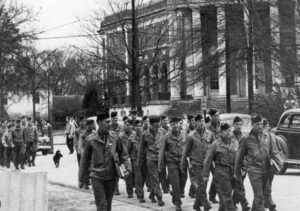
They sent us to the Universities of Alabama and Auburn. I was with the group that went to, the University of Alabama. And while I was there, I guess my development from a little bitty guy in high school. 108 pounds. Now I weighed 160 pounds. I realized I had strength and speed like a Jack Rabbit.
Could you share with us your experiences as a football player for Alabama?
At Alabama, I got to play with the football team. In a game, I was the guy who scored the only touchdown. My center on the team was Frank Barga, all East Center for Temple. My quarterback was from Dartmouth. As for me, I played halfback and he figured it out, and the quarterback from Dartmouth said, do you go through the line? We’re going to run like at the running play.
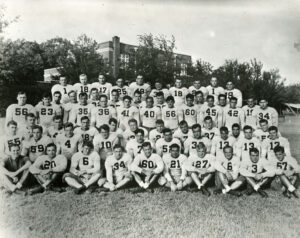
But I get up on the line, he said “I’m going throw it to you.” And I followed his instructions. And for some reason, I must have had my hands back here, didn’t see the ball back. But, I could feel it in my hands. Nothing but the gold posted down there. Awesome. So we made the only touchdown in the game. But that encouraged me to know that I loved sports and I went on and went out for football and then track at the University of Texas.
Later after I got discharged from the Army, I would go on to participate in various football and track and field teams. Daily, I thank God for what he gave me, with me developing from a little bitty fellow to a little fella, and then again to a stronger and stockier man.
How long were you on the front line before you saw combat? How long were you in Europe before the battle happened?
Disabled, killed, and wounded. These were the first words I heard when the Allies invaded Sicily. Most of the people I was with at the University of Alabama, were saddled up at Camp Atterbury, Indiana, a large infantry school.
And we joined this infantry division. They made room for us people and we took their places. We were all infantry people who went to England and joined different infantry divisions that were fighting in France and in Germany.
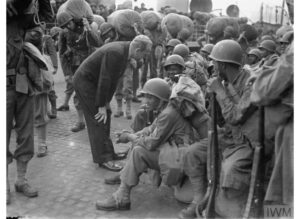
That’s who we replaced. And once or twice before the division went over there, they, they did that with the board, but they didn’t get me. At that time, I was the top shooter. I was just designated to be the sniper. I wasn’t just an ordinary infantry guy. So they shipped all the privates over and had replacements to Europe.
So I stayed with my company captain. Then we’d get new people to arrive, they must have decided this, they, they just stopped using this division as a replacement center and sent, sent us to England. In England, we stayed a month before we headed over to La Havre, France.
After landing in France, we went by truck up through Belgium at the right end of Germany at the line. We were in the Ardennes forest in Belgium, a very forested region in Europe.
One of my fellow soldiers said that he had only a single clip of ammunition (8 bullets). Well, I quickly realized that’s not a lot of bullets to fight with. Overall, we were not equipped with adequate supplies to fight a battle.
On the front lines, a division (10-15k troops) ideally should cover 6 miles. However, we had to cover 26 miles. Prior to the Battle of the Bulge, we had only 4 divisions (~75,000 troops), compared to Germany’s 3 field armies (~300-400k troops). Also, our 28th division has been fighting down in the Hürtgen Forest, so most of our divisions were understrength.
I wondered why, wouldn’t our 28th division just encircle that forest, and keep the Germans in there to go on with their business and go into the Rhineland. Well anyway, the 28th left the Hürtgen Forest and were just south of us.
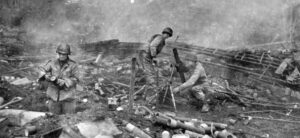
What units did you come to relieve? Also, were there any signs of a German attack while you were posted in Belgium?
And here we came to relieve the 2nd division, which was an experienced infantry outfit. They were just about a month or so before we got there. And then, they joined up with the division that we took their places. The two divisions then worked together in front and they kept the Germans from going up toward Brussels.
The atmosphere was so tranquil. We didn’t hear any trucks or tanks or anything. It seemed like you would’ve heard, of course, you read that. Some people say they could hear rumbling or trucks or hit tanks in the distance, but I never did. I know one of the outfits that I know of, I mean, it wasn’t enough to make us think we were going to be attacked.
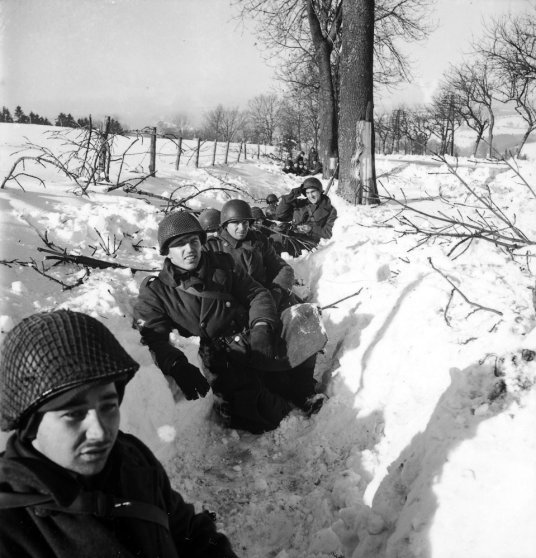
*Part Two of the Herb Sheaner Trilogy will cover his combat experience in the Battle of the Bulge and his capture at the hands of the German Army.
